Презентация Week 1 Leadership styles

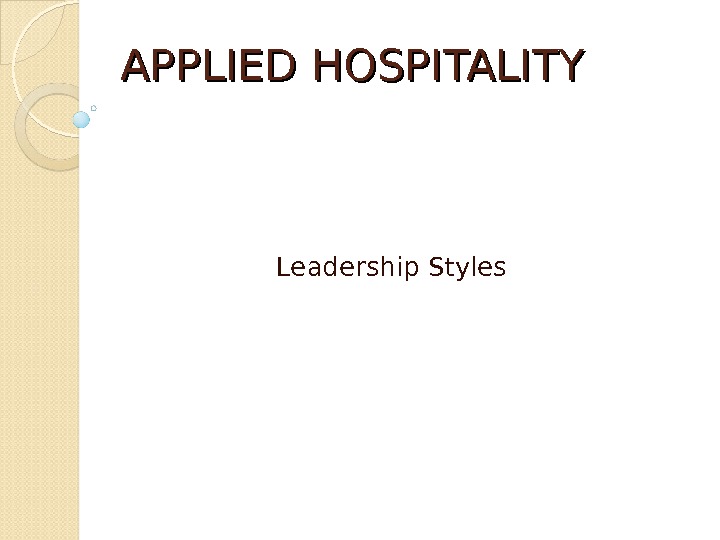

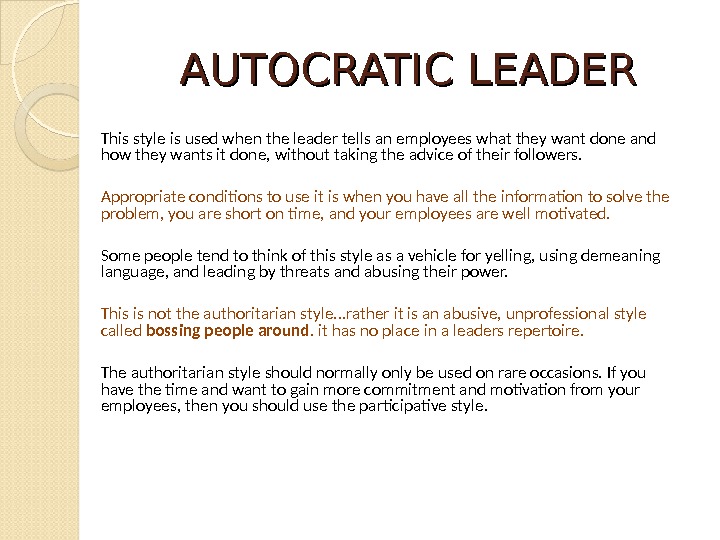
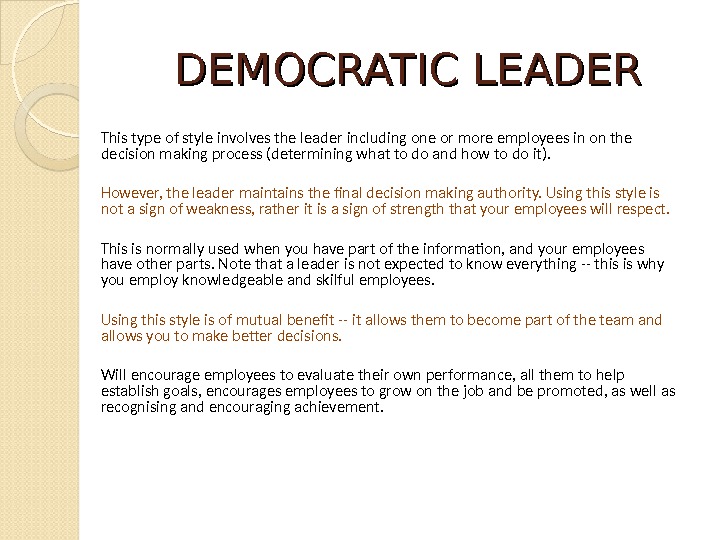

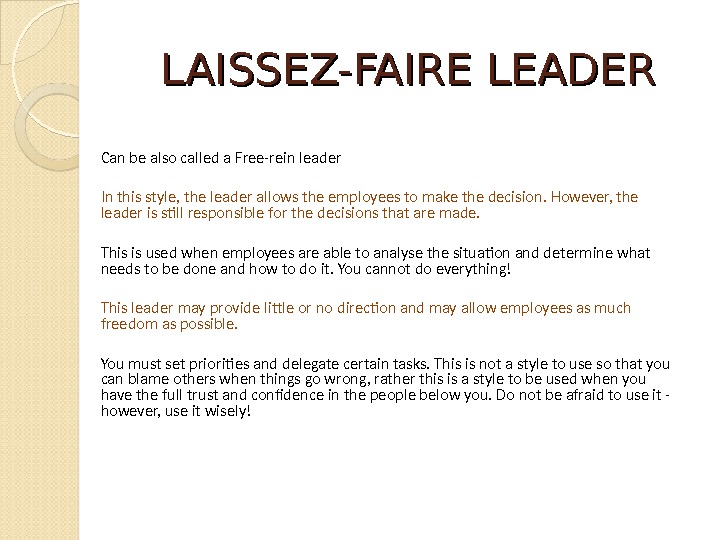


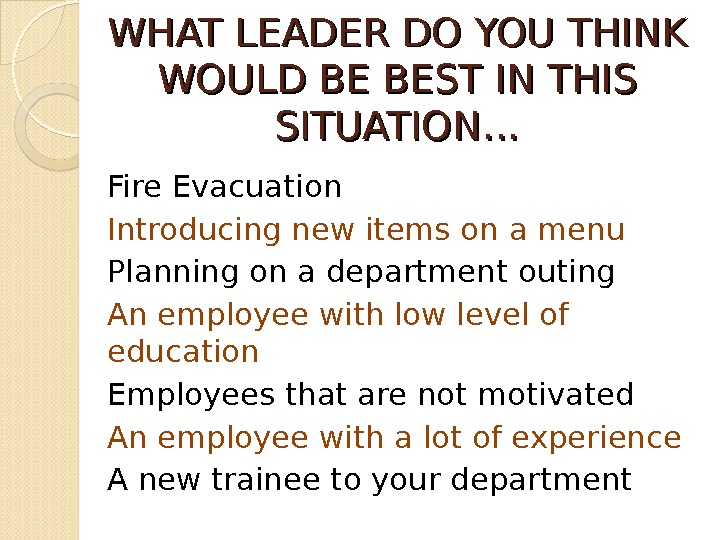
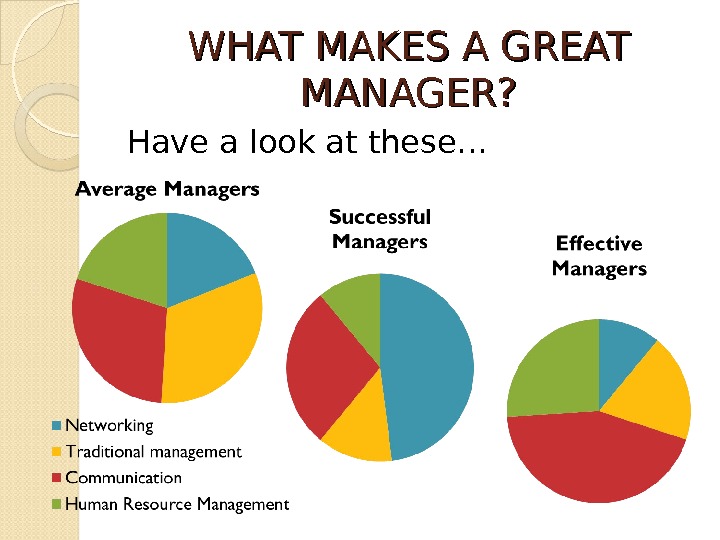
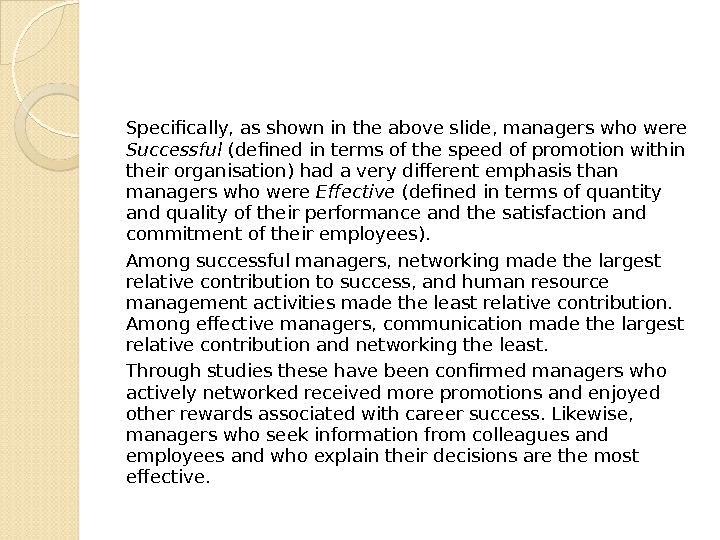
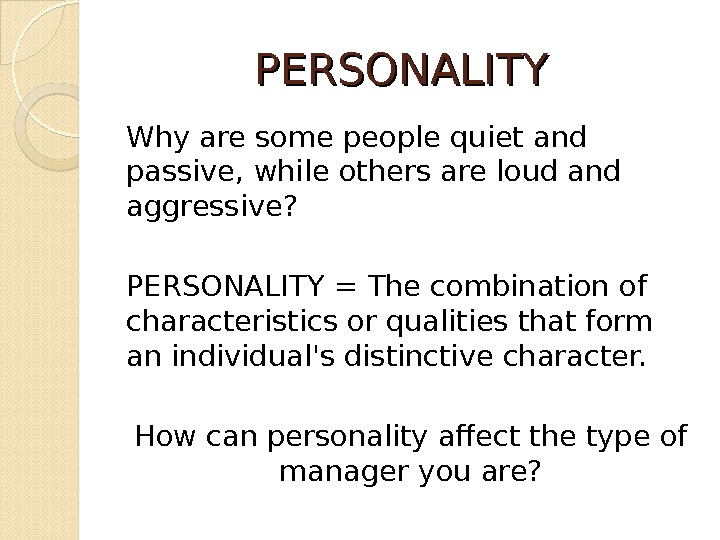
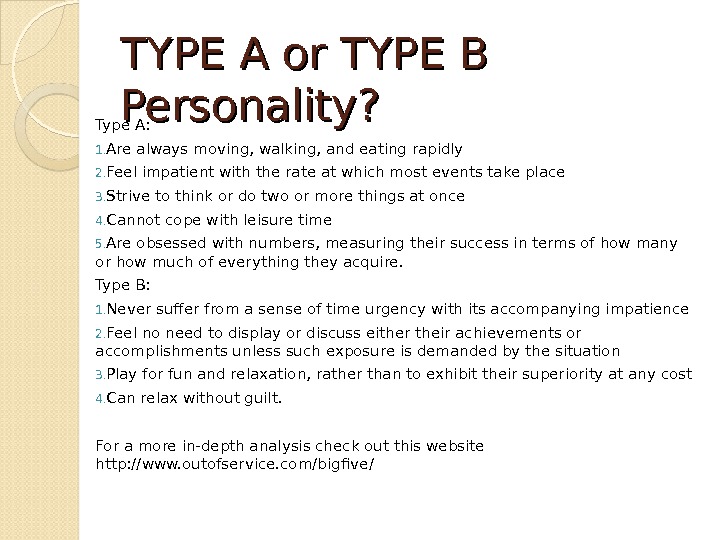
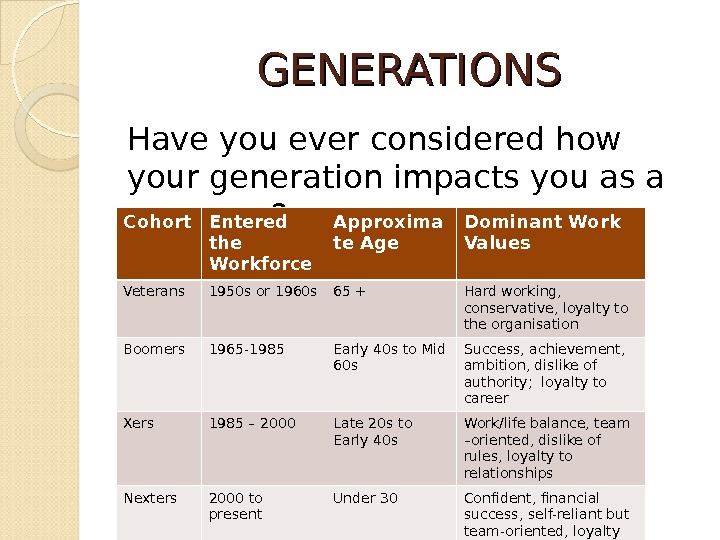
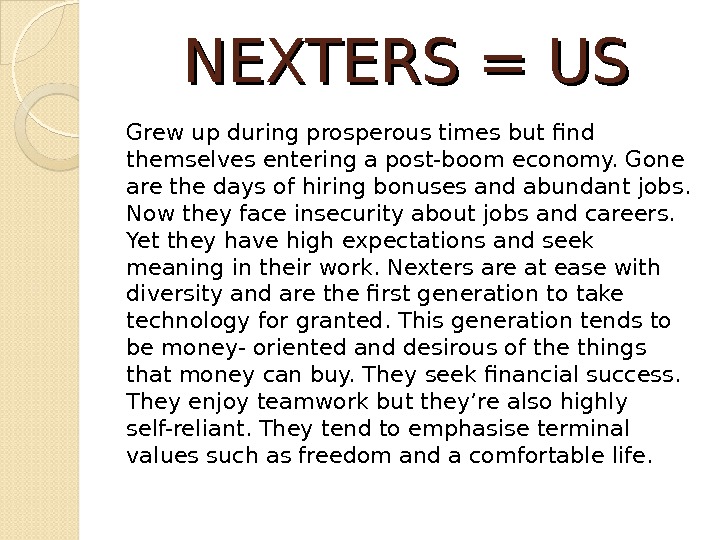
- Размер: 846 Кб
- Количество слайдов: 15
Описание презентации Презентация Week 1 Leadership styles по слайдам
 APPLIED HOSPITALITY Leadership Styles
APPLIED HOSPITALITY Leadership Styles
 LEADERSHIP STYLES • Autocratic • Democratic • Bureaucratic • Laissez Faire (Free Reign) • Theory X • Theory Y
LEADERSHIP STYLES • Autocratic • Democratic • Bureaucratic • Laissez Faire (Free Reign) • Theory X • Theory Y
 AUTOCRATIC LEADER This style is used when the leader tells an employees what they want done and how they wants it done, without taking the advice of their followers. Appropriate conditions to use it is when you have all the information to solve the problem, you are short on time, and your employees are well motivated. Some people tend to think of this style as a vehicle for yelling, using demeaning language, and leading by threats and abusing their power. This is not the authoritarian style. . . rather it is an abusive, unprofessional style called bossing people around. it has no place in a leaders repertoire. The authoritarian style should normally only be used on rare occasions. If you have the time and want to gain more commitment and motivation from your employees, then you should use the participative style.
AUTOCRATIC LEADER This style is used when the leader tells an employees what they want done and how they wants it done, without taking the advice of their followers. Appropriate conditions to use it is when you have all the information to solve the problem, you are short on time, and your employees are well motivated. Some people tend to think of this style as a vehicle for yelling, using demeaning language, and leading by threats and abusing their power. This is not the authoritarian style. . . rather it is an abusive, unprofessional style called bossing people around. it has no place in a leaders repertoire. The authoritarian style should normally only be used on rare occasions. If you have the time and want to gain more commitment and motivation from your employees, then you should use the participative style.
 DEMOCRATIC LEADER This type of style involves the leader including one or more employees in on the decision making process (determining what to do and how to do it). However, the leader maintains the final decision making authority. Using this style is not a sign of weakness, rather it is a sign of strength that your employees will respect. This is normally used when you have part of the information, and your employees have other parts. Note that a leader is not expected to know everything — this is why you employ knowledgeable and skilful employees. Using this style is of mutual benefit — it allows them to become part of the team and allows you to make better decisions. Will encourage employees to evaluate their own performance, all them to help establish goals, encourages employees to grow on the job and be promoted, as well as recognising and encouraging achievement.
DEMOCRATIC LEADER This type of style involves the leader including one or more employees in on the decision making process (determining what to do and how to do it). However, the leader maintains the final decision making authority. Using this style is not a sign of weakness, rather it is a sign of strength that your employees will respect. This is normally used when you have part of the information, and your employees have other parts. Note that a leader is not expected to know everything — this is why you employ knowledgeable and skilful employees. Using this style is of mutual benefit — it allows them to become part of the team and allows you to make better decisions. Will encourage employees to evaluate their own performance, all them to help establish goals, encourages employees to grow on the job and be promoted, as well as recognising and encouraging achievement.
 BUREAUCRATIC LEADER Manages by the book Emphasis on doing things as specified by rules , policies, standards and regulations (SOP). Managers must rely on higher management when problems are not addressed by the ground rules. Can be seen as more of a police man than a leader May be appropriate in many situations in which procedures are established for employees performing routine or repetitive tasks.
BUREAUCRATIC LEADER Manages by the book Emphasis on doing things as specified by rules , policies, standards and regulations (SOP). Managers must rely on higher management when problems are not addressed by the ground rules. Can be seen as more of a police man than a leader May be appropriate in many situations in which procedures are established for employees performing routine or repetitive tasks.
 LAISSEZ-FAIRE LEADER Can be also called a Free-rein leader In this style, the leader allows the employees to make the decision. However, the leader is still responsible for the decisions that are made. This is used when employees are able to analyse the situation and determine what needs to be done and how to do it. You cannot do everything! This leader may provide little or no direction and may allow employees as much freedom as possible. You must set priorities and delegate certain tasks. This is not a style to use so that you can blame others when things go wrong, rather this is a style to be used when you have the full trust and confidence in the people below you. Do not be afraid to use it — however, use it wisely!
LAISSEZ-FAIRE LEADER Can be also called a Free-rein leader In this style, the leader allows the employees to make the decision. However, the leader is still responsible for the decisions that are made. This is used when employees are able to analyse the situation and determine what needs to be done and how to do it. You cannot do everything! This leader may provide little or no direction and may allow employees as much freedom as possible. You must set priorities and delegate certain tasks. This is not a style to use so that you can blame others when things go wrong, rather this is a style to be used when you have the full trust and confidence in the people below you. Do not be afraid to use it — however, use it wisely!
 THEORY X LEADER Have an inherent dislike for work and will avoid it whenever possible. Believes staff must be coerced, controlled, directed, or threatened with punishment in order to get them to achieve the organizational objectives. Prefer to be directed, do not want responsibility, and have little or no ambition. Seek security above all else Have a negative view of human nature that assumes individuals generally dislike work, are irresponsible and require close supervision to do their jobs.
THEORY X LEADER Have an inherent dislike for work and will avoid it whenever possible. Believes staff must be coerced, controlled, directed, or threatened with punishment in order to get them to achieve the organizational objectives. Prefer to be directed, do not want responsibility, and have little or no ambition. Seek security above all else Have a negative view of human nature that assumes individuals generally dislike work, are irresponsible and require close supervision to do their jobs.
 THEORY Y LEADER Believes work is as natural as play and rest. Has commitment to objectives is a function of the rewards associated with their achievement. Believes staff have potential and want to accept and seek responsibility. Creativity, ingenuity, and imagination are widely distributed among the population. People are capable of using these abilities to solve an organizational problem. Has a positive view of human nature and assumes individuals are generally industrious, creative, and able to assume responsibility and exercise self control in their jobs.
THEORY Y LEADER Believes work is as natural as play and rest. Has commitment to objectives is a function of the rewards associated with their achievement. Believes staff have potential and want to accept and seek responsibility. Creativity, ingenuity, and imagination are widely distributed among the population. People are capable of using these abilities to solve an organizational problem. Has a positive view of human nature and assumes individuals are generally industrious, creative, and able to assume responsibility and exercise self control in their jobs.
 WHAT LEADER DO YOU THINK WOULD BE BEST IN THIS SITUATION… Fire Evacuation Introducing new items on a menu Planning on a department outing An employee with low level of education Employees that are not motivated An employee with a lot of experience A new trainee to your department
WHAT LEADER DO YOU THINK WOULD BE BEST IN THIS SITUATION… Fire Evacuation Introducing new items on a menu Planning on a department outing An employee with low level of education Employees that are not motivated An employee with a lot of experience A new trainee to your department
 WHAT MAKES A GREAT MANAGER? Have a look at these…
WHAT MAKES A GREAT MANAGER? Have a look at these…
 Specifically, as shown in the above slide, managers who were Successful (defined in terms of the speed of promotion within their organisation) had a very different emphasis than managers who were Effective (defined in terms of quantity and quality of their performance and the satisfaction and commitment of their employees). Among successful managers, networking made the largest relative contribution to success, and human resource management activities made the least relative contribution. Among effective managers, communication made the largest relative contribution and networking the least. Through studies these have been confirmed managers who actively networked received more promotions and enjoyed other rewards associated with career success. Likewise, managers who seek information from colleagues and employees and who explain their decisions are the most effective.
Specifically, as shown in the above slide, managers who were Successful (defined in terms of the speed of promotion within their organisation) had a very different emphasis than managers who were Effective (defined in terms of quantity and quality of their performance and the satisfaction and commitment of their employees). Among successful managers, networking made the largest relative contribution to success, and human resource management activities made the least relative contribution. Among effective managers, communication made the largest relative contribution and networking the least. Through studies these have been confirmed managers who actively networked received more promotions and enjoyed other rewards associated with career success. Likewise, managers who seek information from colleagues and employees and who explain their decisions are the most effective.
 PERSONALITY Why are some people quiet and passive, while others are loud and aggressive? PERSONALITY = The combination of characteristics or qualities that form an individual’s distinctive character. How can personality affect the type of manager you are?
PERSONALITY Why are some people quiet and passive, while others are loud and aggressive? PERSONALITY = The combination of characteristics or qualities that form an individual’s distinctive character. How can personality affect the type of manager you are?
 TYPE A or TYPE B Personality? Type A: 1. Are always moving, walking, and eating rapidly 2. Feel impatient with the rate at which most events take place 3. Strive to think or do two or more things at once 4. Cannot cope with leisure time 5. Are obsessed with numbers, measuring their success in terms of how many or how much of everything they acquire. Type B: 1. Never suffer from a sense of time urgency with its accompanying impatience 2. Feel no need to display or discuss either their achievements or accomplishments unless such exposure is demanded by the situation 3. Play for fun and relaxation, rather than to exhibit their superiority at any cost 4. Can relax without guilt. For a more in-depth analysis check out this website http: //www. outofservice. com/bigfive/
TYPE A or TYPE B Personality? Type A: 1. Are always moving, walking, and eating rapidly 2. Feel impatient with the rate at which most events take place 3. Strive to think or do two or more things at once 4. Cannot cope with leisure time 5. Are obsessed with numbers, measuring their success in terms of how many or how much of everything they acquire. Type B: 1. Never suffer from a sense of time urgency with its accompanying impatience 2. Feel no need to display or discuss either their achievements or accomplishments unless such exposure is demanded by the situation 3. Play for fun and relaxation, rather than to exhibit their superiority at any cost 4. Can relax without guilt. For a more in-depth analysis check out this website http: //www. outofservice. com/bigfive/
 GENERATIONS Have you ever considered how your generation impacts you as a manager? Cohort Entered the Workforce Approxima te Age Dominant Work Values Veterans 1950 s or 1960 s 65 + Hard working, conservative, loyalty to the organisation Boomers 1965 -1985 Early 40 s to Mid 60 s Success, achievement, ambition, dislike of authority; loyalty to career Xers 1985 – 2000 Late 20 s to Early 40 s Work/life balance, team –oriented, dislike of rules, loyalty to relationships Nexters 2000 to present Under 30 Confident, financial success, self-reliant but team-oriented, loyalty to both self and relationships
GENERATIONS Have you ever considered how your generation impacts you as a manager? Cohort Entered the Workforce Approxima te Age Dominant Work Values Veterans 1950 s or 1960 s 65 + Hard working, conservative, loyalty to the organisation Boomers 1965 -1985 Early 40 s to Mid 60 s Success, achievement, ambition, dislike of authority; loyalty to career Xers 1985 – 2000 Late 20 s to Early 40 s Work/life balance, team –oriented, dislike of rules, loyalty to relationships Nexters 2000 to present Under 30 Confident, financial success, self-reliant but team-oriented, loyalty to both self and relationships
 NEXTERS = US Grew up during prosperous times but find themselves entering a post-boom economy. Gone are the days of hiring bonuses and abundant jobs. Now they face insecurity about jobs and careers. Yet they have high expectations and seek meaning in their work. Nexters are at ease with diversity and are the first generation to take technology for granted. This generation tends to be money- oriented and desirous of the things that money can buy. They seek financial success. They enjoy teamwork but they’re also highly self-reliant. They tend to emphasise terminal values such as freedom and a comfortable life.
NEXTERS = US Grew up during prosperous times but find themselves entering a post-boom economy. Gone are the days of hiring bonuses and abundant jobs. Now they face insecurity about jobs and careers. Yet they have high expectations and seek meaning in their work. Nexters are at ease with diversity and are the first generation to take technology for granted. This generation tends to be money- oriented and desirous of the things that money can buy. They seek financial success. They enjoy teamwork but they’re also highly self-reliant. They tend to emphasise terminal values such as freedom and a comfortable life.

